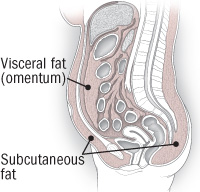Why depression takes a toll on your body
 As of 2012, one in 10 Americans has experienced bouts of depression. This number is estimated to increase by 20 percent each year. Sadly, though, up to 80 percent of these people are not receiving treatment for their depression, whether they are scared to ask for help or are not able to do so, factors are in place preventing treatment from being carried out.
As of 2012, one in 10 Americans has experienced bouts of depression. This number is estimated to increase by 20 percent each year. Sadly, though, up to 80 percent of these people are not receiving treatment for their depression, whether they are scared to ask for help or are not able to do so, factors are in place preventing treatment from being carried out.
With depression on the rise, it is important we inform ourselves about the mental disease so we can have a better understanding and be more open to discussing it and seeking treatment. Depression doesn’t just affect the mind – the long-term effects of depression can greatly impact the body as well. The physical effects of depression on our body are enough to hinder our overall health.
So when you think about depression, also know that there is a definitive link between depression and physical symptoms as well. To understand depression, is to also recognize the side effects of depression and how they can affect the body.
What causes depression?
 An exact cause of depression is still unknown, but researchers have compiled a few factors which could contribute to the onset of depression. These factors include:
An exact cause of depression is still unknown, but researchers have compiled a few factors which could contribute to the onset of depression. These factors include:
Causes of depression
- Biological differences: Physical changes to the brain
- Brain chemistry: Neurotransmitters are out of balance
- Hormones: Unbalance of hormones within the body
- Inherited traits: Family history of depression puts a person at higher risk for depression, although the gene is still unknown
- Life events: Trauma, stress and loss may contribute to depression.
Depression is most commonly found in teens, but it can start at any age. Women are more generally diagnosed with depression than men. Although this may have to do with the fact that women seek out help and medical advice more so than men do.
Alternative factors which can put a person at higher risk to develop depression are the following:
- Substance abuse
- Personality disorders
- Chronic illness
- Traumatic or stressful events.
These are all factors to consider when trying to diagnose depression and considering appropriate treatment. Although it may appear that depression has a lot to do with the brain, physical effects of depression are a very real concern.
Physical effects of depression on our body
 The link between depression and physical symptoms is well noted in medicine. Some of the most common side effects of depression include:
The link between depression and physical symptoms is well noted in medicine. Some of the most common side effects of depression include:
- Increase in physical pain
- Chronic fatigue
- Low libido
- Low appetite
- Lack of sleep or an increase in sleep
- Weight problems
- Increase risk of heart attack
- Weakened immune system
- Impairs the digestive and nervous system.
Oftentimes, the physical effects of depression on our body can become easily dismissed among seniors because the effects can also be attributed to aging. This is why it is so important to spot the difference between signs of aging and side effects of depression.
Among the physical effects of depression on our body are physical aches and pains. These aches and pains are often unexplainable and occur in about two out of three patients who have depression.
Body systems and side effects of depression
 The cardiovascular, digestive and nervous system all experience physiological effects of depression. These are our main bodily systems which allow us to function properly.
The cardiovascular, digestive and nervous system all experience physiological effects of depression. These are our main bodily systems which allow us to function properly.
Our nervous system encounters many side effects of depression, including lack of concentration, feelings of hopelessness, being unable to perform normal everyday tasks, and loss of interest in things they once loved or life in general.
As a means of coping with these feelings and side effects of depression, a person may reach for substances for relief – but self-treating can very easily become self-harming. In fact, abusing substances as a means of self-treatment can only worsen the depression and solidify the long-term effects of depression.
Our digestive system also experiences physiological effects of depression because a depressed person will start to eat much less, disrupting their intake of essential nutrients. If the digestive system doesn’t receive these nutrients it cannot fuel the body, leading to physical effects of depression on our body. Changes in eating habits can also disrupt already pre-existing health problems, such as diabetes, and can further cause constipation, diarrhea, and other stomach-related issues.
Lastly, physiological effects of depression can occur in the cardiovascular system. Given the strong ties between stress and depression, an increase of stress over a long period of time can result in negative side effects of depression. Stress speeds up the heartbeat and constricts blood vessels, preventing the normal flow of blood. The long-term effect of depression to the cardiovascular system is heart disease.
Harvard Medical School found that among those who were hospitalized for depression, they were also two to five times more likely to have chest pains as well. This only reaffirms the physiological effects of depression.
Long-term effects of depression on the immune system
 Out of the biggest systems in the body to experience long-term effects of depression is the immune system. Because depression also causes high levels of stress, stress essentially eats away at the body weakening the immune system.
Out of the biggest systems in the body to experience long-term effects of depression is the immune system. Because depression also causes high levels of stress, stress essentially eats away at the body weakening the immune system.
When our immune system is weak, it cannot fight off illnesses, so those with depression are more likely to experience chronic illness. Worse yet, people with depression have a lower chance of being protected by receiving a vaccination as their immune system is too weak to form the antibodies it needs.
Furthermore, physical effects of depression on our body, like lack of sleep, also work to weaken the immune system. When we don’t sleep, we become restless and our body can’t restore itself.
If someone with depression and lack of sleep also has a pre-existing illness, this illness can become worse. And lack of sleep can also worsen the depression as well. The vicious cycle that depression and lack of sleep cause on the immune system makes for a very unhealthy person who simply cannot bounce out of it.
Combating depression and reducing side effects of depression
Seeking professional treatment is key to reduce the physical and physiological effects of depression. Having the courage to combat depression is the first step to the road of recovery and not only getting your mind back, but your body as well.
The physical effects of depression on our body can truly take a toll and inhibit us from doing the things we love. Likewise, the physiological effects of depression can harm us from the inside out. The only way to deter the long-term effects of depression from occurring is to take a stance today and opt for treatment.
Having a tight support group is a good place to start. Feeling comfortable and opening up to loved ones is the stepping stone to bringing you to that next level of recovery. Your mind, and body, will thank you if you do.
-
Interested In Weight Loss That Works? This Advice Will Help!
Being overweight can kill you. While reversing those scales is a l
-
A Healthy Balanced Diet: Eating Healthy Fats Is Not Just Good For You But It Is A Requirement To Remain Living
Irrespective of the place you acquire your info from, youll discove
-
Eating Fibre - Prevents Disease and Helps You Lose Weight Naturally!
Fad diets come and go, but the importanc
-
Weight Loss Goals - Stomach Shaping And Weight Loss
The fat on the stomach, also referred to as belly fat, is one of the b
-
Why Cant I Lose Weight
Why cant I lose weight?Thats the question many people ask when their w
-
Lose Weight by Keeping a Diary
A diary is not only for recording good and bad memories that have happ
- DON'T MISS
- Diet Program: We Want to See You Succeed
- Five Healthy Rapid Weight Loss Tips
- Lose Weight Fast Can It Happen
- Advice for Your Weight Loss Goals
- Understanding Carbohydrates And Why You Need Them!
- Microbiotic Diet A Low Fat Way Of Dieting
- Lose 20 Pounds in 60 Days: Sample Weight Loss Plan
- Thinking Ahead To Lose Weight
- Staying Positive is Important to Help Lose Weight
- 3 Diet Plans To Lose Weight Fast




